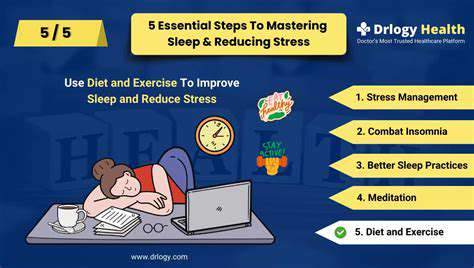Your Personalized Guide to Optimal Sleep for Mental Health

Mindfulness and Stress Management Techniques for Sound Sleep
Understanding the Connection Between Mindfulness and Sleep
Mindfulness practices, by focusing on the present moment without judgment, can significantly reduce stress and anxiety. Chronic stress is a major contributor to sleep disturbances. By cultivating awareness of our thoughts and feelings without getting carried away by them, we can begin to detach from the anxieties that often keep us awake at night. This detachment allows the mind to quiet down, preparing the body for the restorative sleep it needs.
When we're stressed, our bodies release hormones like cortisol, which can interfere with the natural sleep-wake cycle. Mindfulness helps regulate these responses, promoting a calmer state that is conducive to falling asleep and staying asleep. This understanding of the link between mental state and sleep quality is fundamental to developing personalized strategies for better rest.
Practicing Grounding Techniques for Better Sleep
Grounding techniques are simple mindfulness exercises that help anchor you in the present moment. These techniques can be particularly helpful when racing thoughts or anxieties are keeping you up. A simple grounding technique involves focusing on the sensations of your body – the feeling of your feet on the floor, the weight of your hands in your lap. This focus on the physical helps to shift your attention away from anxious thoughts and towards the present.
Deep breathing exercises are another excellent grounding technique. By consciously focusing on your breath, you can regulate your nervous system and calm your mind. Regular practice of these techniques can retrain your body's response to stress, making it easier to fall asleep and achieve restful sleep.
Mindful Breathing Exercises for Relaxation
Incorporating mindful breathing into your daily routine can significantly reduce stress and improve sleep quality. These exercises involve focusing on the sensation of each breath – the air entering and leaving your lungs. This focus on the present moment helps to quiet the mental chatter that often interferes with sleep.
There are various mindful breathing techniques available. One common technique involves inhaling deeply through your nose, holding the breath for a few seconds, and exhaling slowly through your mouth. Regular practice of such exercises can help to regulate your heart rate and blood pressure, creating a more relaxed state conducive to sleep.
Progressive Muscle Relaxation for Stress Reduction
Progressive muscle relaxation is a technique that involves systematically tensing and releasing different muscle groups in your body. This process helps to release physical tension, which is often a contributing factor to stress and sleeplessness. By focusing on the sensation of tension and relaxation in different muscle groups, you can bring awareness to physical sensations and learn to manage them.
This technique can help to calm the body and mind, creating a more relaxed state conducive to sleep. By systematically relaxing different muscle groups, you can identify areas of tension and release them, promoting a sense of physical and mental ease that aids in falling asleep.
Creating a Relaxing Bedtime Routine
Establishing a consistent bedtime routine can significantly improve your sleep quality. A relaxing routine signals to your body that it's time to wind down, preparing it for sleep. This routine could include taking a warm bath, reading a book, or listening to calming music. The key is to choose activities that promote relaxation and calmness.
Creating a quiet and dark environment in your bedroom is also important for promoting sleep. Avoid using electronic devices before bed, as the blue light emitted from screens can interfere with melatonin production, a hormone crucial for regulating the sleep-wake cycle. These simple steps can drastically improve your sleep quality.
Identifying and Addressing Underlying Issues
Sometimes, sleep problems are linked to underlying medical conditions or psychological issues. If you're consistently struggling with sleep, it's important to consult a healthcare professional to rule out any underlying medical causes.
Addressing potential psychological factors, such as anxiety or depression, is also crucial. A therapist or counselor can provide support and guidance in managing these issues, leading to improved sleep quality. Seeking professional help is often a necessary step in achieving sustainable and lasting improvements in sleep.
Journaling for Self-Reflection and Emotional Processing
Keeping a sleep journal can be a powerful tool for understanding your sleep patterns and identifying potential triggers for sleeplessness. Noting down your bedtime, wake-up time, and any factors that might have influenced your sleep can provide valuable insights.
Journaling can also be helpful for processing emotions and thoughts that might be contributing to stress and anxiety, which are often linked to sleep problems. By recording your feelings and thoughts, you can gain a better understanding of your emotional state and develop strategies for managing them effectively. This self-reflection is a key component of a personalized approach to stress management and improved sleep.
Read more about Your Personalized Guide to Optimal Sleep for Mental Health
Hot Recommendations
- Customized Sleep Schedules: AI Driven for Sustainable Rest
- Crafting a Personalized Productivity Plan for Mental Clarity
- Sustainable Self Compassion: Cultivating Kindness Towards Your Mind
- Sustainable Productivity Hacks for the Busy Professional
- Sustainable Wellness for Parents: Balancing Family and Self Care
- Data Informed Self Care: Designing Your Personalized Wellness Strategy
- Sustainable Wellness for a Purpose Driven Life
- AI Assisted Mindfulness: Personalized Meditations for Deeper Practice
- Building Inclusive Mental Health Services: Key Initiatives
- AI Powered Self Care: Customizing Your Routine for Maximum Impact










